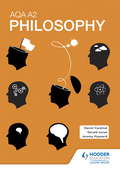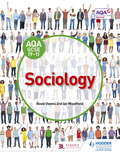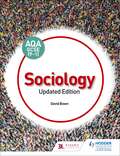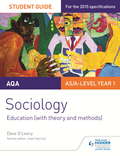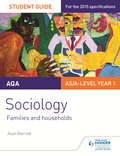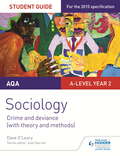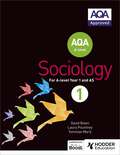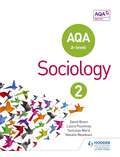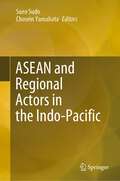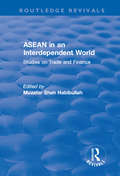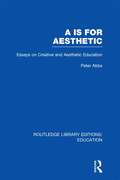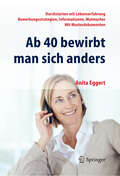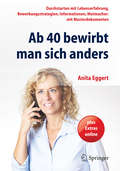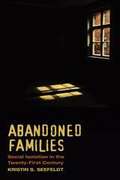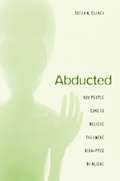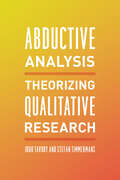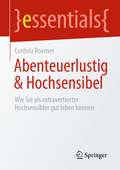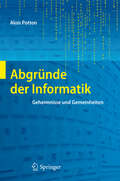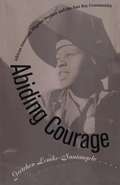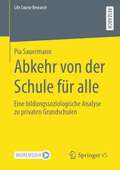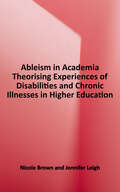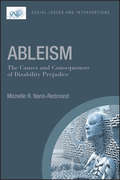- Table View
- List View
AQA A2 Philosophy
by Dan Cardinal Jeremy Hayward Gerald JonesMotivate students to think philosophically with this accessible and imaginative guide for the latest specification, brought to you by the market-leading publisher for A-level Philosophy.Written by the authors of our bestselling AQA AS Philosophy textbook, this title covers both A2 units, Ethics and Philosophy of Mind, using the same clear style and modern examples throughout.- Cements knowledge and understanding of complex philosophical concepts through detailed coverage of key topics, student-friendly language and explanatory diagrams- Develops students' analytical skills and their own philosophical viewpoints using a variety of thought-provoking practical activities and tasks- Helps students to engage with the anthology texts at the back of the book with clear prompts in every chapter- Stretches high achievers through signposted extension material that enhances high-level critical thinking skills- Draws on the author team's extensive practical teaching experience to provide a coherent and stimulating route through the 2014 specification
AQA GCSE (9-1) Sociology
by Ian Woodfield Rosie OwensProgressively develop students subject knowledge, conceptual understanding and critical thinking skills with a wealth of targeted activities, guidance and assessment preparation tailored to the 2017 AQA GCSE Sociology specification.- Aid understanding of the main points and core concepts with key content summaries and accessible diagrams- Improve research skills with topical examples and methods in context sections for every topic- Extend learning and enhance responses with extension questions, stimulus material and suggestions for further reading - Prepare students for assessment with skills-building activities and practice questions developed for the new specification
AQA GCSE (9-1) Sociology, Updated Edition
by David BownFully revised and updated, AQA GCSE (9-1) Sociology will guide your students, topic-by-topic, through the 2017 specification, with features specially designed to be accessible to all students so they can:- ensure they have understood each topic and grasped key points with Content Summaries and Check your understanding questions- consolidate their knowledge with activities and extension opportunities to take them beyond the text- define and use key terms in the specification with confidence- use Research in Action sections to understand the work of key sociologists- prepare for assessments with Practice Questions based on the 2017 specification, together with answer guidance and commentaryAQA GCSE (9-1) Sociology has been reviewed by Sociology academics to ensure all content is accurate, sensitive, contextualised and evidence-based.
AQA GCSE (9-1) Sociology, Updated Edition
by David BownFully revised and updated, AQA GCSE (9-1) Sociology will guide your students, topic-by-topic, through the 2017 specification, with features specially designed to be accessible to all students so they can:- ensure they have understood each topic and grasped key points with Content Summaries and Check your understanding questions- consolidate their knowledge with activities and extension opportunities to take them beyond the text- define and use key terms in the specification with confidence- use Research in Action sections to understand the work of key sociologists- prepare for assessments with Practice Questions based on the 2017 specification, together with answer guidance and commentaryAQA GCSE (9-1) Sociology has been reviewed by Sociology academics to ensure all content is accurate, sensitive, contextualised and evidence-based.
AQA Sociology Student Guide 1: Education (with theory and methods)
by Dave O'LearyWritten by experienced teacher Dave O'Leary, this Student Guide for Sociology:- Identifies the key content you need to know with a concise summary of topics examined in the AS and A-level specifications- Enables you to measure your understanding with exam tips and knowledge check questions, with answers at the end of the guide- Helps you to improve your exam technique with sample answers to exam-style questions- Develops your independent learning skills with content you can use for further study and research
AQA Sociology Student Guide 2: Families and households
by Joan GarrodWritten by experienced author Joan Garrod, this Student Guide for Sociology:- Identifies the key content you need to know with a concise summary of topics examined in the AS and A-level specifications- Enables you to measure your understanding with exam tips and knowledge check questions, with answers at the end of the guide- Helps you to improve your exam technique with sample answers to exam-style questions- Develops your independent learning skills with content you can use for further study and research
AQA Sociology Student Guide 3: Crime and deviance (with theory and methods)
by Dave O'LearyWritten by experienced teacher Dave O'Leary, this Student Guide for Sociology:-Identifies the key content you need to know with a concise summary of topics examined in the A-level specifications-Enables you to measure your understanding with exam tips and knowledge check questions, with answers at the end of the guide-Helps you to improve your exam technique with sample answers to exam-style questions-Develops your independent learning skills with content you can use for further study and research
AQA Sociology for A-level Book 1
by David Bown Laura Pountney Tomislav MaricExam Board: AQALevel: AS/A-levelSubject: SociologyFirst Teaching: September 2015First Exam: June 2016Build students' understanding with this concept-driven approach to the 2015 AQA A-level Sociology specification, written by a team of leading subject authors and approved by AQA.- Develop the knowledge required to master Year 1 topics with clear and accessible content coverage- Build confidence in the evaluative skills needed to assess sociological theories and research- Strengthen learning and revision with a wealth of practice and extension questions and activities
AQA Sociology for A-level Book 1 (AQA A-Level #1)
by David Bown Laura Pountney Tomislav MaricExam Board: AQALevel: AS/A-levelSubject: SociologyFirst Teaching: September 2015First Exam: June 2016Build students' understanding with this concept-driven approach to the 2015 AQA A-level Sociology specification, written by a team of leading subject authors and approved by AQA.- Develop the knowledge required to master Year 1 topics with clear and accessible content coverage- Build confidence in the evaluative skills needed to assess sociological theories and research- Strengthen learning and revision with a wealth of practice and extension questions and activities
AQA Sociology for A-level Book 2
by David Bown Laura Pountney Tomislav Maric Natalie MeadowsExam Board: AQALevel: AS/A-levelSubject: SociologyFirst Teaching: September 2016First Exam: June 2017Build students' understanding with this concept-driven approach to the 2015 AQA A-level Sociology specification, written by a team of leading subject authors and approved by AQA.- Develop the knowledge required to master Year 2 topics with clear and accessible content coverage- Build confidence in the evaluative skills needed to assess sociological theories and research- Strengthen learning and revision with a wealth of practice and extension questions and activities
AQA Sociology for A-level Book 2
by David Bown Laura Pountney Tomislav Maric Natalie MeadowsExam Board: AQALevel: AS/A-levelSubject: SociologyFirst Teaching: September 2016First Exam: June 2017Build students' understanding with this concept-driven approach to the 2015 AQA A-level Sociology specification, written by a team of leading subject authors and approved by AQA.- Develop the knowledge required to master Year 2 topics with clear and accessible content coverage- Build confidence in the evaluative skills needed to assess sociological theories and research- Strengthen learning and revision with a wealth of practice and extension questions and activities
ASEAN and Regional Actors in the Indo-Pacific
by Sueo Sudo Chosein YamahataThis book discusses the shifting regional geopolitical engagements and development of rearranged connections emerging among ASEAN and non-ASEAN actors.First, the book focuses on the crucial discourse surrounding the Indo-Pacific region, including its challenges, continuity, and relevance. The discussion highlights the growing influence of regional actors such as India, Thailand, Japan, and the US, particularly in the context of a pressing question of collaboration versus containment amidst China’s rise. The book delves into various topics, such as geopolitical anxieties, economic strength, foreign policy, international relations, development, and security promotion in South and Southeast Asia, through the lenses of ASEAN centrality and the Indo-Pacific strategy.Second, the volume emphasizes on the escalating tensions and the worsening crises in the region that cause major anxieties and the subsequent realignment and new alignment of countries’ relationships. Among several chapters of the volume, a large Indo-China state, Myanmar, takes a special place in the book’s discussions as it has grown as an important ground for a resource/energy race among geopolitically strategic partners. Additionally, Myanmar has the potential to become a balancer in ASEAN. Therefore, any positive development and change in course of relations to Myanmar, particularly with its neighbors, Japan, and Russia, in both historical and contemporary contexts, can have a significant impact not only on Myanmar’s course towards peace, democracy, and security, but also regional stability. The editors and contributors examine the unique position of ASEAN, with a focus on ASEAN centrality as a platform for addressing anxieties and building relationships to bridge the gap between world and regional players, including both friends and foes.Overall, the volume provides valuable insights into the Indo-Pacific region’s complex dynamics, including cooperation and collaboration among regional actors for long-term stability and prosperity. The interdisciplinary composition of the book invites readers from various backgrounds to engage with constructive debates on general perception, contextual discussion, and the highlights of engaged research from local and international perspectives.
ASEAN in an Interdependent World: Studies in an Interdependent World (Routledge Revivals)
by Muzafar Shah HabibullahThis title was first published in 2000. This volume contains nine selected applied economic papers presented during the 1999 Faculty of Economics and Management Seminar in Melaka. The articles included focus the studies on trade and finance in Malaysia and other ASEAN member countries.
Aa is for Aesthetic: Essays on Creative and Aesthetic Education (Routledge Library Editions: Education)
by Peter AbbsThis volume reaffirms the indispensable place of the arts in any coherent curriculum. The author hopes that the specific arguments formulated in the book will advance the conservationist post-Modernist aesthetic.
Ab 40 bewirbt man sich anders. Durchstarten mit Lebenserfahrung - Bewerbungsstrategien, Informationen, Mutmacher - mit Musterdokumenten: Durchstarten Mit Lebenserfahrung  Bewerbungsstrategien, Informationen, Mutmacher  Mit Musterdokumenten
by Anita EggertAnlässe für Menschen ab 40, sich neu zu bewerben, gibt es viele: Eine Stellenanzeige reizt zu einem beruflichen Neustart, nach einer Erziehungspause steht der Wiedereinstieg an o. ä. Das Buch unterstützt Bewerber, indem es einen systematischen Überblick über alle Phasen gibt: von der Stellensuche über das Telefoninterview bis zum Bewerbungsgespräch. Die Autorin liefert die wichtigsten Tipps für eine zeitgemäße und korrekte Bewerbung sowie Hilfen, um zu einer selbstbewussten inneren Haltung zu finden. Begleitende Website mit Arbeitsmaterialien.
Ab 40 bewirbt man sich anders: Durchstarten mit Lebenserfahrung, Bewerbungsstrategien, Informationen, Mutmacher: mit Musterdokumenten
by Anita EggertEs gibt viele gute Gründe, sich mit ,,über 40" auf dem Arbeitsmarkt zu bewerben! - Doch vieles ist dann nicht mehr so selbstverständlich wie damals nach der Ausbildung und es tauchen Fragen auf: Wo finde ich eigentlich heutzutage Jobs? Wie bewerbe ich mich zeitgemäß? Wie bringe ich einen roten Faden in meinen Lebenslauf? Wie vermittele ich einen professionellen Eindruck? Anita Eggert begleitet Sie im Bewerbungsprozess und hilft Ihnen, eine selbstbewusste Einstellung zu entwickeln, Ihr Profil zu schärfen und einen erfolgreichen Schlachtplan zu entwickeln. Ihr Buch gibt Tipps für alle Phasen der Bewerbung, von der Stellensuche über das Telefoninterview bis zum Bewerbungsgespräch, liefert Fakten für eine individuelle, zeitgemäße und korrekte Bewerbung und Hilfen für ein überzeugendes Auftreten. - NEU in der 2. Auflage sind Infos zu Arbeitgeber-Bewertungsportalen im Internet, dem richtigen Outfit in Vorstellungsgesprächen sowie neuen Smartphone-Apps. Auf der begleitenden Website www. ab-40-bewirbt-man-sich-anders. de finden Sie stets aktuelle Infos und praktische Arbeitsmaterialien (Lebensläufe, Checklisten und ganze neu: Motivationsanschreiben etc).
Abandoned Families: Social Isolation in the Twenty-First Century
by Kristin S. SeefeldtEducation, employment, and home ownership have long been considered stepping stones to the middle class. But in Abandoned Families, social policy expert Kristin Seefeldt shows how many working families have access only to a separate but unequal set of poor-quality jobs, low-performing schools, and declining housing markets which offer few chances for upward mobility. Through in-depth interviews over a six-year period with women in Detroit, Seefeldt charts the increasing social isolation of many low-income workers, particularly African Americans, and analyzes how economic and residential segregation keep them from achieving the American Dream of upward mobility. Seefeldt explores the economic and political obstacles that have altered the pathways for opportunity. She finds that while many low-income individuals work, enroll in higher education, and attempt to use social safety net benefits in times of crisis, they primarily have access to subpar institutions, which often hamper their efforts to get ahead. Many of these workers hold unstable, low-paying service sector jobs that provide few paths for advancement and exacerbate their social isolation. Those who pursue higher education to gain qualifications for better paying jobs often enroll in for-profit schools and online programs that push them into debt but rarely lead to secure employment or even a degree. And while home ownership was once the best way to establish wealth, Seefeldt finds that in declining cities like Detroit, it can saddle low-income owners with underwater mortgages in depopulated neighborhoods. Finally, she shows that the 1996 federal welfare reform and other retrenchments in the social safety net have made it more difficult for struggling families to access public benefits that could alleviate their economic hardships. When benefits are difficult to access, families often take on debt as a way of managing. Taken together, these factors contribute to what Seefeldt calls the “social abandonment” of vulnerable families. Abandoned Families is a timely, on-the-ground assessment of hardship in contemporary America. Seefeldt exposes the shortcomings of the institutions that once fostered upward mobility and shows how sweeping policy measures—including new labor protections, expansion of the social safety net, increased regulation of for-profit colleges, and reparations—could help lift up those who have fallen behind.
Abducted: How People Come to Believe They Were Kidnapped by Aliens
by Susan A. ClancyThey are tiny. They are tall. They are gray. They are green. They survey our world with enormous glowing eyes. To conduct their shocking experiments, they creep in at night to carry humans off to their spaceships. Yet there is no evidence that they exist at all. So how could anyone believe he or she was abducted by aliens? Or want to believe it? To answer these questions, psychologist Susan Clancy interviewed and evaluated "abductees"--old and young, male and female, religious and agnostic. She listened closely to their stories--how they struggled to explain something strange in their remembered experience, how abduction seemed plausible, and how, having suspected abduction, they began to recollect it, aided by suggestion and hypnosis. Clancy argues that abductees are sane and intelligent people who have unwittingly created vivid false memories from a toxic mix of nightmares, culturally available texts (abduction reports began only after stories of extraterrestrials appeared in films and on TV), and a powerful drive for meaning that science is unable to satisfy. For them, otherworldly terror can become a transforming, even inspiring experience. "Being abducted," writes Clancy, "may be a baptism in the new religion of this millennium." This book is not only a subtle exploration of the workings of memory, but a sensitive inquiry into the nature of belief.
Abductive Analysis: Theorizing Qualitative Research
by Stefan Timmermans Iddo TavoryIn Abductive Analysis, Iddo Tavory and Stefan Timmermans provide a new navigational map for theorizing qualitative research. They outline a way to think about observations, methods, and theories that nurtures theory formation without locking it into predefined conceptual boxes. The book provides novel ways to approach the challenges that plague qualitative researchers across the social sciences—how to conceptualize causality, how to manage the variation of observations, and how to leverage the researcher’s community of inquiry. Abductive Analysis is a landmark work that shows how a pragmatist approach provides a productive and fruitful way to conduct qualitative research.
Abenteuerlustig & Hochsensibel: Wie Sie als extravertierter Hochsensibler gut leben können (essentials)
by Cordula RoemerAgil, gesellig und empfindsam? Hochsensibilität gilt allgemein als eine eher introvertierte Veranlagung. Dennoch gibt es feinfühlige Menschen, die sowohl empfindsam sind und sich zugleich extravertiert durch das Leben bewegen. Wie aber passt dies beides zusammen? Schließen sich die beiden Wesenszüge nicht einander aus? Diesen und weiteren Fragen folgt die Autorin in einem kritischen Diskurs, um mehr Klarheit in den Dschungel unterschiedlicher Zuschreibungen und Erklärungen zu bringen. Dieser Diskurs möchte dazu beitragen, die Gefahr einer möglichen Fehlinterpretation im Rahmen einer fachspezifischen Begleitung in Beratung, Coaching und Therapie bei hochsensiblen Menschen zu verringern. Der zweite Teil des Buches gibt Ihnen umfangreiche und vielfältige Tipps und Methoden zum Umgang mit einer extravertierten Hochsensibilität an die Hand.
Abgründe der Informatik: Geheimnisse und Gemeinheiten
by Alois PottonWas Sie schon immer über die Informatik und "die Informatiker" wissen wollten, aber nie zu fragen wagten, Alois Potton hat es notiert: Über mehr als zwei Jahrzehnte hat er hinter die Kulissen geblickt und Anekdoten in 80 Glossen gegossen. Schonungslos, bösartig und zum Teil politisch nicht ganz korrekt analysiert er den alltäglichen Wahnsinn und die Absurditäten der IT-Szene. Allgemein verständlich geschrieben, werden sich auch Nichtinformatiker angesichts analoger Vorgänge in ihrem Arbeitsbereich amüsieren - oder aber beleidigt fühlen.
Abkehr von der Schule für alle: Eine bildungssoziologische Analyse zu privaten Grundschulen (Life Course Research)
by Pia SauermannVor dem Hintergrund eines expandierenden Privatschulsektors einerseits und der Konzeption der für allen gemeinsamen Grundschule andererseits untersucht die vorliegende Arbeit, ob private Grundschulen in Deutschland Bildungsungleichheiten verstärken. Betrachtet werden einerseits die Selektivität der Privatschulwahl und andererseits die Effekte, welche der Besuch einer privaten Grundschule auf die Kompetenzentwicklung hat. Beide Aspekte werden auf Basis von Daten des Nationalen Bildungspanels untersucht. Die Befunde weisen darauf hin, dass die Wahl einer privaten Grundschule insbesondere in städtischen Gebieten und in Ostdeutschland vom Bildungsniveau und vom kulturellen Kapital der Eltern abhängt. Wird die soziale Selektivität der Privatschulwahl berücksichtigt, zeigt sich kein Effekt privater Beschulung auf die Entwicklung von Lese- und Mathematikkompetenzen.
Ableism in Academia: Theorising Experiences of Disabilities and Chronic Illnesses in Higher Education
by Jennifer Leigh Nicole BrownRather than embracing difference, academic ecosystems seek to normalize and homogenize ways of working and of being a researcher. As a consequence, ableism is an endemic experience in academia, though to date no attempt has been made to theorize those experiences. Ableism in Academia provides an interdisciplinary outlook on ableism that is currently missing. Through reporting research data and exploring personal experiences, the contributors explore the concept of what it means to be and to work outside the so-called norm. The volume brings together a range of perspectives, including feminism, post-structuralism, Derridean and Foucauldian theory, crip theory, and disability theory, and draws on a number of related disciplines. Contributors use various schools of theory to raise awareness and increase understanding of the marginalized. These theories are placed in the context of neoliberal academia and used to interrogate aspects of identity and how disability is performed, and to argue that ableism is not just a disability issue. This timely collection will be of interest to researchers in disability studies, higher education studies, and sociology, as well as to those working across the social sciences.
Ableism: The Causes and Consequences of Disability Prejudice (Contemporary Social Issues)
by Michelle R. Nario-RedmondThe first comprehensive volume to integrate social-scientific literature on the origins and manifestations of prejudice against disabled people Ableism, prejudice against disabled people stereotyped as incompetent and dependent, can elicit a range of reactions that include fear, contempt, pity, and inspiration. Current literature—often narrowly focused on a specific aspect of the subject or limited in scope to psychoanalytic tradition—fails to examine the many origins and manifestations of ableism. Filling a significant gap in the field, Ableism: The Causes and Consequences of Disability Prejudice is the first work to synthesize classic and contemporary studies on the evolutionary, ideological, and cognitive-emotional sources of ableism. This comprehensive volume examines new manifestations of ableism, summarizes the state of research on disability prejudice, and explores real-world personal accounts and interventions to illustrate the various forms and impacts of ableism. This important contribution to the field combines evidence from multiple theoretical perspectives, including published and unpublished work from both disabled and nondisabled constituents, on the causes, consequences, and elimination of disability prejudice. Each chapter places findings in the context of contemporary theories—identifying methodological limits and suggesting alternative interpretations. Topics include the evolutionary and existential origins of disability prejudice, cultural and impairment-specific stereotypes, interventions to reduce prejudice, and how to effect social change through collective action and advocacy. Adopting a holistic approach to the study of disability prejudice, this accessibly-written volume: Provides an inclusive, up-to-date exploration of the origins and expressions of ableism Addresses how to resist ableist practices, prioritize accessible policies, and create more equitable social relations with pages earmarked for activists and allies Focuses on interpersonal and intergroup analysis from a social-psychological perspective Integrates research from multiple disciplines to illustrate critical cognitive, affective and behavioral mechanisms and manifestations of ableism Suggests future research directions based on topics covered in each chapter Ableism: The Causes and Consequences of Disability Prejudice is an important resource for social, community and rehabilitation psychologists, scholars and researchers of disability studies, and students, activists, and academics across political, sociological, and humanistic disciplines.
